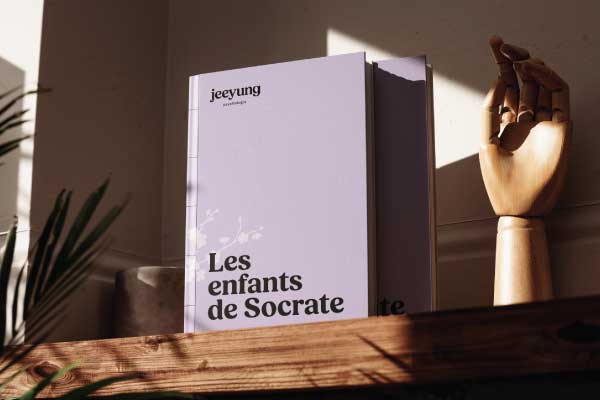The Children of Socrates
Accelerated training specially designed for busy parents who are keen to provide a fair, balanced and guilt-free education.
Composed of 6 courses developed by Jee Yung Caillaux, humanist psychologist, trainer, speaker and mother of 3 girls, the Jee Yung method is aimed at parents who wish to raise children in accordance with humanist values, aware that they are beings in their own right that they enjoy accompanying in the discovery of their full potential; and of the unique color that shapes their personality.
It also aims to considerably lighten the burden of the most difficult job in the world, that of parent, by providing concrete, simple and effective tools that you can start to apply from the first lesson and whose benefits are instantly palpable.
Lesson 1: Anger and Emotion Management
In this course, you will discover a fundamental concept in the management of emotions and daily life: validation . Although many people think they already know how to do it; being a fairly popularized but nevertheless misused concept, this powerful tool allows us to recognize, express and regulate emotions in a healthy and constructive way.
You will also learn the concepts of bubble and vase , which will help you understand where your child’s anger comes from, how and when it manifests itself, and how to empty the vase or defuse it permanently using proven techniques.
At the end of the capsule, practical and situational exercises are offered to help you consolidate and perfect the learning you have received.
What you will learn:
Lesson 2: Self-esteem
In this course, we will see in more detail the notion of validation by relying on concrete examples. We will also talk about this other big piece that makes up our existence: self-esteem . This treasure that accompanies us through our different experiences, the choices we make, is decisive and as parents, we have the responsibility and the chance to lay the foundations of this treasure chest that our children will take with them wherever they go.
Indeed, instead of complimenting your child excessively and making him believe that he is a champion because he got back up after a fall, something that you probably do with the intention of strengthening his self-esteem but that he will unfortunately not believe and which above all will not help him to have more confidence in himself, we will learn to fill his chest with sincere and objective qualifications that truly represent him.
We will also learn about acts of love that will make your child feel truly loved and appreciated. There is often a gap between what we do to make our child feel loved and whether they actually feel loved.
At the end of the capsule, practical and situational exercises are offered to help you consolidate and perfect the learning you have received.
What you will learn:
Lesson 3: Children’s opposition and cooperation
In this course, we will address the needs of parents to establish routines and operating rules that will ensure that the child knows how to live in society, but above all, we will see how to ensure that the child understands the purpose of these rules and respect them .
We will also talk about the notion of small meannesses that cause us to unknowingly attack our children in the demands we make of them and to which they oppose.
At the end of the capsule, practical and situational exercises are offered to help you consolidate and perfect the learning you have received.
What you will learn:
Lesson 4: Supervising children without punishing them
This course is a continuation of course 3 on cooperation. It covers the major markers and benefits of supervision, effective replacement techniques for punishment and tools for using obligation. A bonus will be offered to you on the explanation of children’s anxiety according to Jee Yung.
At the end of the capsule, practical and situational exercises are offered to help you consolidate and perfect the learning you have received.
What you will learn:
Lesson 5: Autonomy and accountability
This course explains how to make children independent. We address the notion of informing children which will allow them to better understand and carry out a task that was not necessarily within their reach.
Indeed, we do not help our children by doing things for them. Instead, let’s invest a little time in explaining their environment to them and how they can better control it. This will lay the foundations for their empowerment and logistical responsibility (brushing teeth, preparing lunch boxes) but also psychological (teaching them to think for themselves, educating them without indoctrinating them).
At the end of the capsule, practical and situational exercises are offered to help you consolidate and perfect the learning you have received.
What you will learn:
Lesson 6: Sibling Rivalry and Feelings of Injustice
In this course, you will learn how to care for and manage the emotions of siblings so that each person feels unique and valued according to their own needs.
We will also deconstruct the notion of equality between brothers and sisters . Something that we have learned through education manuals but which in reality only accentuates the feeling of injustice. Indeed, our children do not all have the same needs or limits and this is what you will learn to determine and respect in this module.
At the end of the capsule, practical and situational exercises are offered to help you consolidate and perfect the learning you have received.
What you will learn:
As you will have understood, thanks to this training, you will no longer need to consult. Its primary objective is to make you yourself autonomous. You will become your own psychologist and that of your child.

